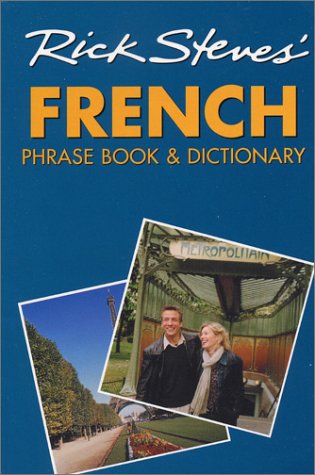There’s really no excuse for it. Yet people do it here in Paris all of the time. I’ve seen them doing it & I’ve overheard them in restaurants, shops & cafés. Worst yet – I’ve been with people when they’ve done it.
American tourists speaking English…assuming that the French person they are speaking to also speaks English.
There are really only a couple of reasons why an American would come over to France without taking the time before their trip to learn a few essential phrases: laziness & arrogance.
Seriously, it doesn’t take much time & it isn’t such an extravagant expense to pick up one of these in preparation for a trip to France.
Yet, a ridiculous number of people don’t fucking bother with it. The book pictured above is less than $10. I purchased the same one a few years ago. It hardly broke the bank. I was still able to afford some Taco Bell & cigarettes later that day.
Don’t get me wrong – there likely are not many French natives who are expecting the average American tourist to achieve fluency before taking a 2 week vacation to Europe. What I’m talking about is just a handful of useful necessary words & phrases that can only benefit the tourist – as opposed to a typical resident of Paris, or easily annoyed American expat living in France.
I was standing in line behind an American woman who asked the Frenchman working the ticket booth in the métro station, “Yeah…do you speak English?” & the French employee shook his head, saying “non”. The woman stared at him, dumbfounded, before she decided to break the language barrier by screaming: “DO YOU SPEAK ENGLISH?”
This technique, in spite of the $10 that it will save, is sadly, not very effective.
The great thing about those little phrasebooks is that it will teach a tourist how to ask, “parlez-vous anglais?” at a reasonable volume.
Now, I think that a great many people back home in the states will use “please” & “thank you” fairly often. I’ve seen them do it. I’ve witnessed countless occasions where a customer has replied with a friendly “thank you” when a waiter hands them a menu in a restaurant. They’re capable. Well, most of them. It doesn’t seem too unrealistic then, to think that maybe throwing a “merci” to a French waiter is just as simple.
As I said, learning a few words can only benefit the tourist. Simply saying “bonjour” when walking into a shop may make the difference between a friendly sales person & someone who thinks that you’re a complete tool. Being able to ask, “Où est la toilette?” might be better than squatting in the alley next to that hobo who has been following you around since you left the Louvre. But, hey – I don’t know what you do for kicks.
Really, being able to say “please”, “thank you” & “hello” in French can make a big difference. Throw in “where is…” & “how much”, along with the ability to point at objects or a map & you’re all set. It’s hardly rocket surgery.
Of course, I realize that this doesn’t only apply to Americans or French people. The same is true for anyone visiting anywhere. However, a Spanish person pulling this shit in Mongolia really isn’t going to annoy me, personally. Some short-tempered Mongolian can rant about that.
Olivier & I are planning a road trip to Germany in the not-so distant future. Since he knows a little German, I’ve been asking him to teach me a few phrases, in spite of my awareness that many Germans speak English extremely well. I’d just feel better knowing that I can say to them myself, “Hello, mister. Please bring more meat & beers. Where is the toilet? Sorry about your shoes.”
I think they’ll appreciate it, too.
I understand if I haven’t convinced you. However, maybe this will:
[tags]French, tourist, American, English, France, Paris, phrasebook, language, polite, manners, travel[/tags]

[…] be confusing. However, I’ve mentioned before the importance of shelling out a few bucks for a fucking phrase book before setting out on a vacation to a foreign country. A phrase book isn’t just important […]
Ditto!
I love this post.
My Halfway To France is all shitted up and I thought nothing would ever make me laugh again but you proved me wrong–again.
Merci!
I was already convinced before I saw the video clip, and by the end of it I wanted to shoot him!
I’ve seen that sort of behaviour in France more than once, and each time I was embarrassed to be an Anglophone. A long time ago someone advised me that wherever you go in the world you should at least learn how to say thank you in the local language. It will make a huge difference.